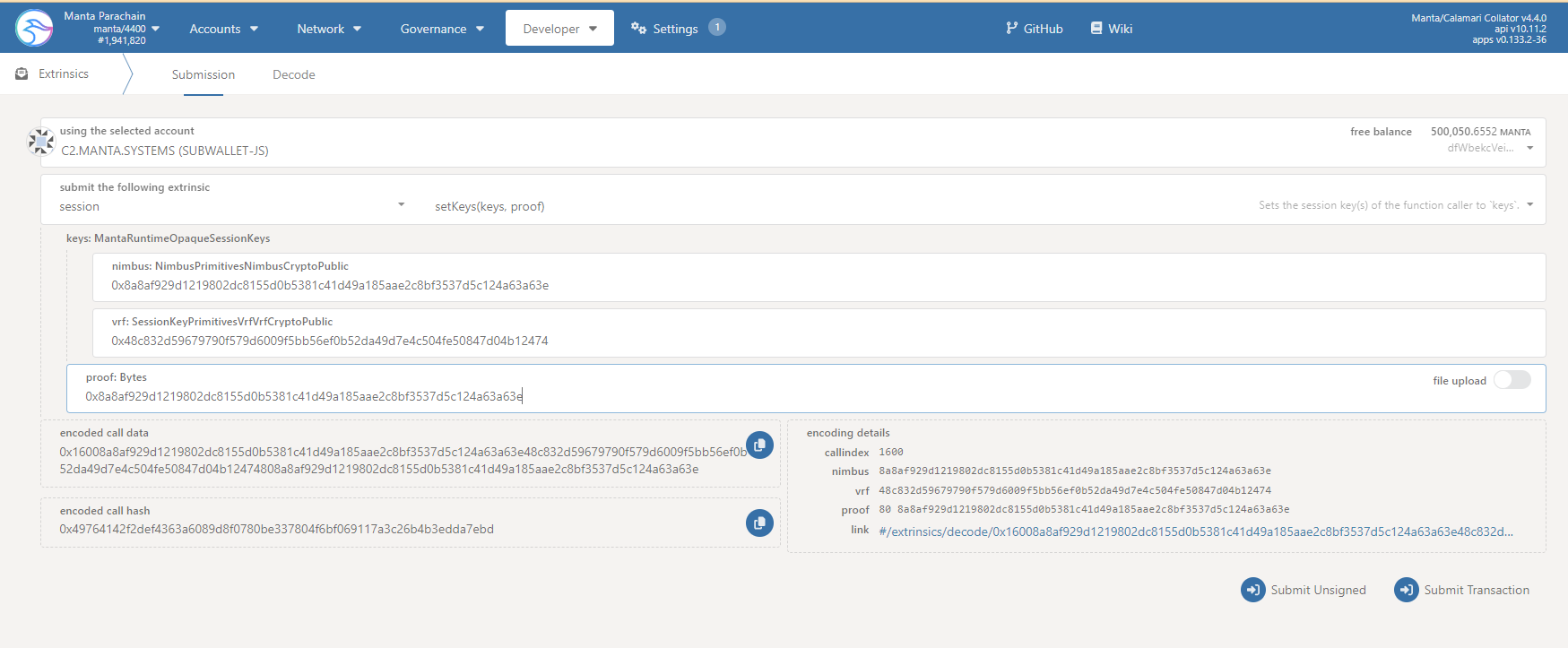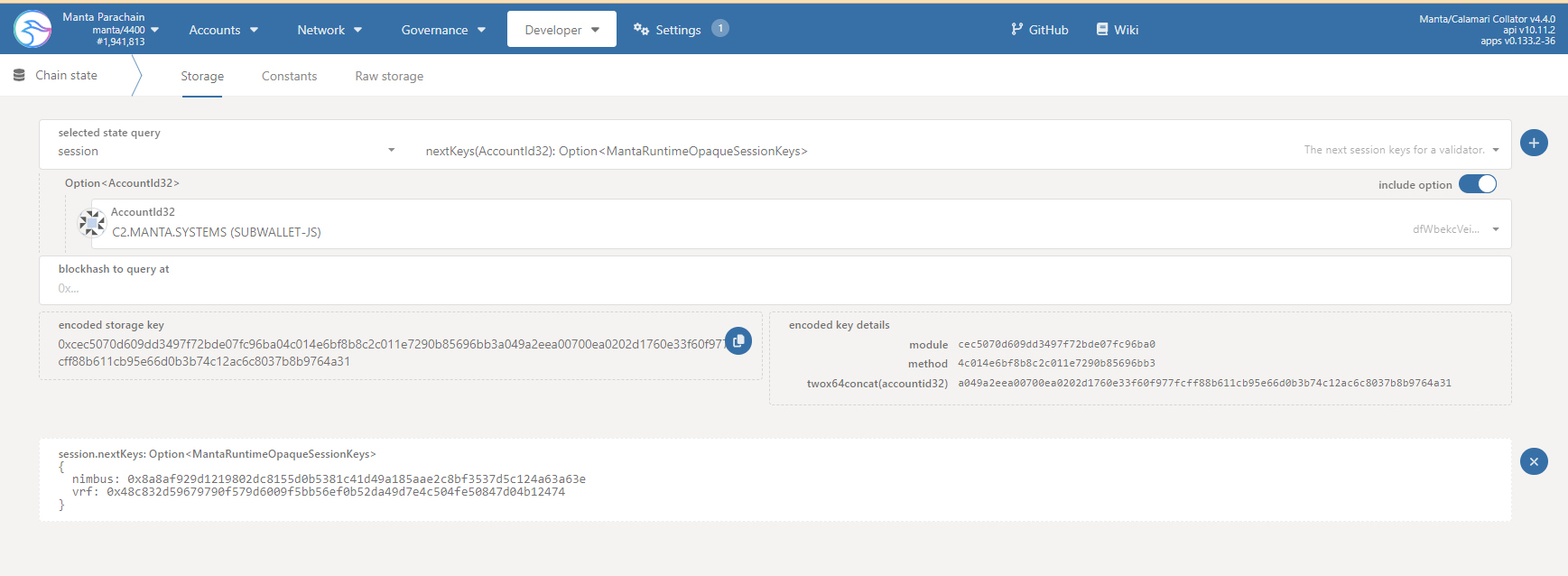🚄 Setup and run a Collator
Installation > Configuration > Running > Sync > Session keys > Bond
🔑 Collator session keys
To collate on the Manta chain, two accounts/keys are required at any given time:
- Collator Account: This is the account that holds the collator bond. it is also the account that the collator's share of transaction fees will be deposited into. the bond cannot be spent while the account is collating. the keys for this account should be protected carefully and should never exist on the filesystem of the collator node.
- Nimbus Session Key: This is a disposable account used to identify your individual node and blocks it has produced with other nodes on the network. Substrate stores this key in the parachain keystore on the filesystem of the collator node (
/var/lib/substrate/chains/manta/keystore) when either of the author_insertKey or author_rotateKeys RPC methods are called. As this is a hot-wallet key that can be abused to impersonate your node if leaked (potentially leading to slashing of deposited funds in the future) it is good practice to infrequently rotate the session key - typically every half year, once per session at most.
Both keys are associated with one another to create a bond-node pair for transaction fee reward payouts and (in the future) slashing.
In addition, your node might have two additional keys in storage:
- Aura Session Key: Now-unused key to decide eligibility to author blocks before v3.3.0
- VRF Session Key: Placeholder for a future VRF-based block proposer assignment mechanism that is inactive as of v3.2.1. The future mechanism will use the key you set here, so if you set it now, you won't have to touch the node later when it is enabled.
Both of the following methods (insert, rotate) use an unsafe RPC call to set the node session key.
In order to use them, you must stop the node if running and start it with a --rpc-methods=unsafe CLI parameter.
This mode of operation is unsafe when exposed to the public internet, restart the node without this CLI parameter when done.
- insertKey
- rotateKeys
This command demonstrates a session key insertion using a key created with
- Build/Install subkey for your platform
- Install the jq utility for your platform
- Generate a Nimbus (nmbs) key and insert/check payloads with subkey/jq
#!/bin/bash
subkey generate \
--scheme sr25519 \
--network manta \
--output-type json \
--words 12 \
> ./nmbs.json
echo '{
"jsonrpc":"2.0",
"id":1,
"method":"author_insertKey",
"params": [
"nmbs",
"nmbs mnemonic phrase",
"nmbs hex public key"
]
}' | jq \
--arg mnemonic "$(jq -r .secretPhrase ./nmbs.json)" \
--arg hex "$(jq -r .publicKey ./nmbs.json)" \
'. | .params[1] = $mnemonic | .params[2] = $hex' > ./insert-nmbs.json
echo '{
"jsonrpc":"2.0",
"id":1,
"method":"author_hasKey",
"params": [
"nmbs hex public key",
"nmbs"
]
}' | jq \
--arg hex "$(jq -r .publicKey ./nmbs.json)" \
'. | .params[0] = $hex' > ./check-nmbs.json - Generate a VRF (rand) key and insert/check payloads with subkey/jq
#!/bin/bash
subkey generate \
--scheme sr25519 \
--network manta \
--output-type json \
--words 12 \
> ./rand.json
echo '{
"jsonrpc":"2.0",
"id":1,
"method":"author_insertKey",
"params": [
"rand",
"rand mnemonic phrase",
"rand hex public key"
]
}' | jq \
--arg mnemonic "$(jq -r .secretPhrase ./rand.json)" \
--arg hex "$(jq -r .publicKey ./rand.json)" \
'. | .params[1] = $mnemonic | .params[2] = $hex' > ./insert-rand.json
echo '{
"jsonrpc":"2.0",
"id":1,
"method":"author_hasKey",
"params": [
"rand hex public key",
"rand"
]
}' | jq \
--arg hex "$(jq -r .publicKey ./rand.json)" \
'. | .params[0] = $hex' > ./check-rand.json - Execute the
author_insertKeyRPC payloads#!/bin/bash
for key in nmbs rand; do
curl \
--header 'Content-Type: application/json;charset=utf-8' \
--data @./insert-${key}.json \
http://localhost:9133
done - Validation: Check that the session keys stored in the node match the generated ones (below command returns a
"result":truefield)#!/bin/bash
for key in nmbs rand; do
has_key=$(curl \
-s \
--header 'Content-Type: application/json;charset=utf-8' \
--data @./check-${key}.json \
http://localhost:9133 )
echo "${key}: ${has_key}"
done - Validation: Check that node logs show your node is running with role:
AUTHORITY(check the timestamps)#!/bin/bash
journalctl -u manta.service -g AUTHORITY - Note down the
publicKeyfields fromnmbs.jsonandrand.jsonand/or back-up these key files to a secure, offline location - Cleanup: Remove secrets from the filesystem that were created in earlier steps
#!/bin/bash
rm ./nmbs.json ./rand.json ./insert-nmbs.json ./insert-rand.json
Ensure your node is fully synced before attempting this method
This command rotates session keys, i.e. creates a new private key in its keystore and outputs the corresponding public keys. If old keys exist, they remain present in the node's keystore and are not deleted.
The private keys are not displayed by the node, if you wish to back them up in order to restore your node credentials in case of loss of the node, follow the instructions in insertKey. If your session keys get lost without backup, you will have to go through the collator program ondboarding process again with your new node
Run
#!/bin/bash
curl -H 'Content-Type: application/json' --data '{ "jsonrpc":"2.0", "method":"author_rotateKeys", "id":1 }' http://localhost:9933
Output from this RPC call should look like the following and is a concatenation of three 32-byte public keys in one long hex number.
{"jsonrpc":"2.0","result":"0x06736e65ab33fd1e4e3e434a1fa2c5425f0e263ddb50e6aeb15951288c562f6906736e65ab33fd1e4e3e434a1fa2c5425f0e263ddb50e6aeb15951288c562f6106736e65ab33fd1e4e3e434a1fa2c5425f0e263ddb40e6aeb15911288c562f63","id":1}
Strip the leading 0x and then split this number after every 64 characters to recover the three constituent public keys.
Prepend each of them individually with a 0x and note them for further use. It should look like
nimbus => 0x8a8af929d1219802dc8155d0b5381c41d49a185aae2c8bf3537d5c124a63a63e
VRF => 0x48c832d59679790f579d6009f5bb56ef0b52da49d7e4c504fe50847d04b12474
Verify that your node does NOT show log lines like 2022-07-19 17:24:18 [Parachain] 🔏 No Nimbus keys available. We will not be able to author.
If it does even after restarting the node the procedure above failed, redo the above steps following the instructions closely.
Bind collator account to the Session Keys
If your collator node logs do not contain both [Relaychain] 💤 Idle and [Parachain] 💤 Idle messages, your node is still syncing. DO NOT BIND a collator account to session key if sync is incomplete. Doing so may result in ejection of your collator.
Account binding is done on-chain. The simplest way to do this is using polkadot.js.
- Load manta/developer/extrinsics in a browser:
 note
noteAlthough the screenshot shows a connected dolphin node, the procedure is identical when connected to the Manta Network
- In the first box, labelled "using the selected account", select the collator account holding the collator MANTA bond.
- In the second (dropdown) box labelled "submit the following extrinsic", select
session. - In the third (dropdown) box, select
setKeys(keys, proof)::: - In the fifth box, labelled
nimbus: NimbusPrimitivesNimbusCryptoPublic, enter the hex public key of the Nimbus session key you generated earlier. - In the sixth box, labelled
vrf: SessionKeyPrimitivesVrfVrfCryptoPublic, enter the hex public key of the VRF session key you generated earlier. - In the seventh box labelled
proof: Bytes, enter the hex public key of the Nimbus session key again. - Click on the
Submit Transactionbutton and wait for confirmation (a green tick), to appear in the upper right corner of the browser window.
- Verfy that the collator account and the Session keys are bound by loading manta/developer/chain state in a browser:
 note
noteAlthough the screenshot shows a connected dolphin node, the procedure is identical when connected to the Manta Network
- In the first (dropdown) box, labelled "selected state query", select
session. - In the second (dropdown) box, select
nextKeys(AccountId32): Option<MantaRuntimeOpaqueSessionKeys>. - In the third (dropdown) box, select the collator account holding the MANTA collator bond.
- Leave the
include optioncheckbox selected. - Leave the
blockhash to query atbox set to the default0xvalue. - Click on the small plus (
+) icon to the right of the second dropdown box. - Verify that a new box labelled
session.nextKeys(AccountId32): Option<MantaRuntimeOpaqueSessionKeys>appears and contains a json object whose,nimbusandvrfvalues are set to the hex public keys generated earlier.
- In the first (dropdown) box, labelled "selected state query", select